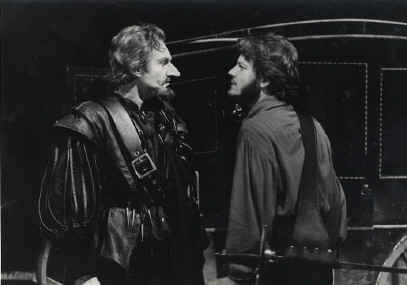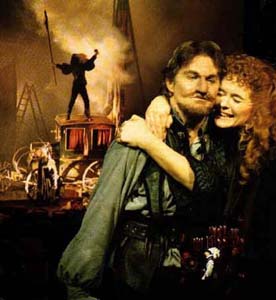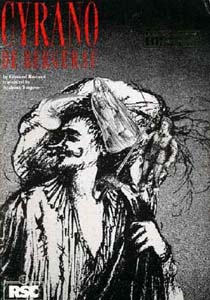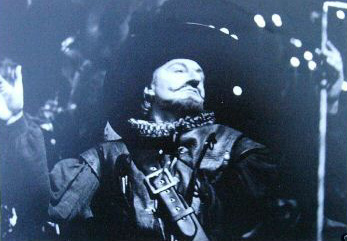|
 |



1983 - Derek Jacobi

Aldwich Theatre - Londres
"Derek Jacobi was awarded the 1983 London Critics Circle Theatre Award (Drama Theatre Award) for Best Actor for his performances in Cyrano de Bergerac and Much Ado About Nothing". Cette production a été reprise en 1984 au Gershwin Theatre, puis par la télévision l'année suivante.
La traduction est signée de celui qui est sans doute le plus célèbre adaptateur de la pièce en langue anglaise, Anthony Burgess.
Rhyme and Panache by Anthony Burgess, 1984
In my new version of Cyrano de Bergerac for the Royal Shakespeare Company, you will hear a lot of rhyme, but you will not always be able to predict when the rhymes are coming. In other words, the principle is rhyme without heroic couplets, except in two major arias of Cyrano, where the regular slam of an expected pattern seemed to be called for. We do not take kindly to rhyme on the British stage, but neither a prose nor a blank verse Cyrano seems to be to be acceptable. Both have been tried, and the panache of the big-nosed hero seems to be much diminished without the dandyism of rhyme.
This term panache is important. It is a noble word and very much Cyrano's own. It is the last word of the play, and translates literally as ?white plume.' But Cyrano has given it a metaphorical signification which cannot easily be rendered by an English term. Indeed, English does not try, and panache has been adopted into our language to mean a kind of elegant assertiveness, a chivalric allegro con brio quality (there we go again, calling on a foreign expression), not really congenial to the British, with their tendency to understate and underplay. By panache Cyrano seems to mean a kind of flamboyant grace, an extravagance of gesture which can be expressed as much in defeat as in conquest. Cyrano wins fights and contests of wit, but he is essentially a loser: his ugly great nose ensures that he cannot succeed in love, and his whole story is one of amorous failure. Stoicism is his line, but not the grey grim stoicism of Seneca?rather a celebration of defeat by means of the plumes and trumpets of victory. In a musical version of Cyrano I wrote for Broadway (I seem to have devoted too much of my life to Cyrano) I had the following lines:
To follow your chivalric calling
When the Alps and the Pyrenees are falling,
To file your nails when the doomsday trumpets crash:
That's panache.
It is, too.
Cyrano continues to be an attractive character, even in an age when chivalry and plumed display seem to be out of date. There is total defiance of authority but no brutality of language or gesture. There is failure turned into triumph. There is mastery of many techniques but not boasting about the mastery. There is an ugliness which consoles the ugly. We are disposed to pity Cyrano but we are not allowed to: he is well aware of the possibility of pity and is armed against it. What makes him piquantly up to date is his outer-space dimension: he has, he says, visited the moon. He would, were he alive today, hate the corporate state, but would avoid political activism as likely to impair his individuality. He has learned how to live with nothing except his own mad talents. He does not live in the stockbroker belt, but he does not live in the ghetto or commune either. He has the qualities of a folk-hero but he has the greater authority of actually having existed as a historical personage. His friend Le Bret wrote his life, and he himself as the father of science fiction as well as a respectable poet and dramatist. But it is Rostand's romanticization of him that has driven out the biographical truth. There is Cyrano de Bergerac (Savinien), there are ?Cyrano de Bergerac' and Cyrano de Bergerac. Cyrano de Bergerac may be a romantic, dated play?in spite of its well-made structure?but ?Cyrano de Bergerac' is a great hero.
Distribution
Derek Jacobi : Cyrano de Bergerac
Jimmy Gardner : Doorkeeper/Capuchin
Richard Clifford : Cavalryman/Gascony Cadet
Robert Clare : D'Artagnan/Gascony Cadet
Philip Dennis : Flunkey/Gascony Cadet
John Tramper : Flunkey/Gascony Cadet
Geoffrey Freshwater : Musketeer
Alexandra Brook : Flowergirl/Sister Claire
Niall Padden : Eater/Gascony Cadet
Phillip Walsh : Drinker/Gascony Cadet
Simon Clark : Citizen/Gascony Cadet
Stephen Kennedy : Page
Raymond Llewellyn : Pickpocket
Jeffery Dench : Marquis 1
David Glover : Marquis 2
Dennis Clinton : Cuigy
Edward Jewesbury : Brisaille
George R. Parsons : Lignière the Poet
Tom Mannion : Christian de Neuvillette
Penelope Beaumont : Precieuse/Mother Marguerite/Lise
Clare Byam-Shaw : Precieuse
Cathy Finlay : Food Seller/Sister Marthe
Pete Postlethwaite : Ragueneau
John Bowe : Le Bret
Sinéad Cusack : Roxane
Jennie Goossens : Roxane's Duenna
John Carlisle : Le Comte de Guiche
Christopher Bowen : Le Vicomte de Valvert/Gascony Cadet
|
 |
ROYAUME-UNI









» Sir Derek Jacobi

» Derek Jacobi et Cyrano

» Photos de la version télévisée
Publié le 01 / 06 / 2005.

 Imprimer Imprimer
 Envoyer Envoyer
 Retour Retour
| Publicité |

|
|
|
 |





